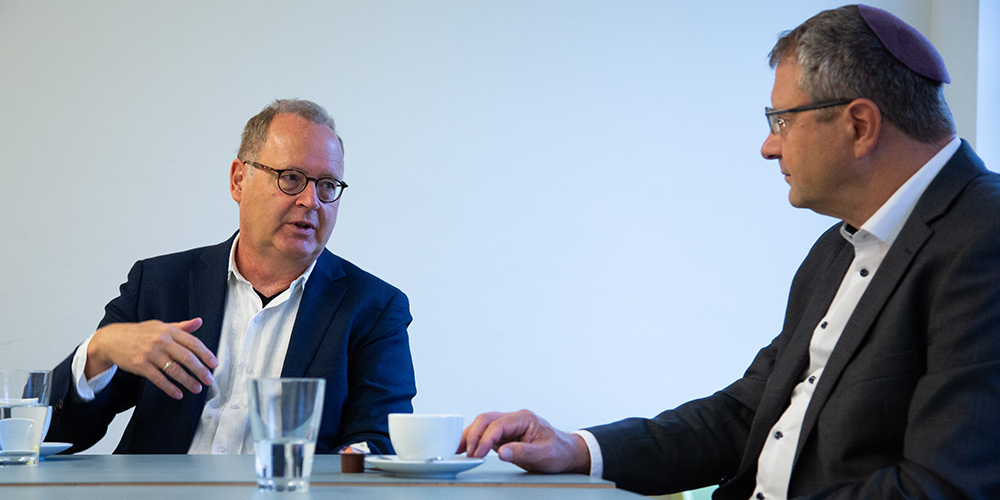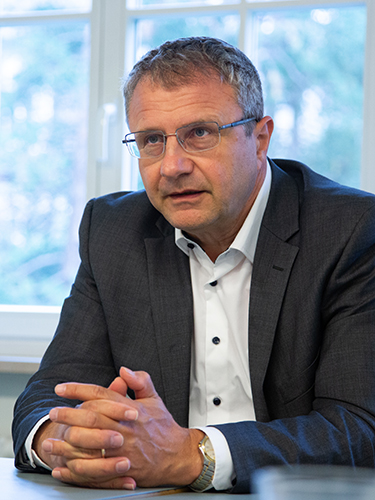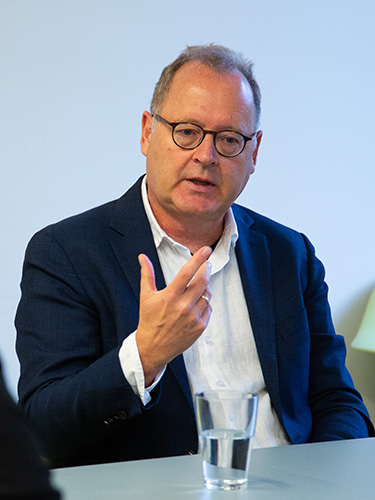How the Middle East conflict is changing academia
After almost a year of war in the Middle East, the question is what role science should play: comment, observe, exclude? Alfred Bodenheimer and Maurus Reinkowski talk about differences of opinion, political science and the emotions that find their way into the university.
01 October 2024 | Noëmi Kern, Catherine Weyer
Mr. Bodenheimer, Mr. Reinkowski, would you have expected this war between Israel and the Palestinians to last so long?
Bodenheimer: No. Israel is generally a country of short wars. Because it is a small country, it does not have the resources to persist for long in a protracted war. Many things have turned out differently than expected. I did not expect that there would be so few paradigm shifts in Israeli politics. The fact that the Israeli government wasn’t forced to resign was a big surprise to me.
Reinkowski: That the war would last a year was something none of us could or wanted to foresee.
How has your work as an academic changed since 7 October?
Bodenheimer: I have received a huge wave of public inquiries, probably because I was in Israel on 7 October 2023 and sometimes live there. But a lot has also changed in my day-to-day work: many things have become more political. In the past, we academics were able to discuss controversial issues and address different opinions. That is the kind of academic approach we would like to see. Today, that’s difficult – I see it as damaging to the university.
Reinkowski: The 7th of October and the war that followed has led to a tribalization of positions. You belong to our tribe or the other tribe. And in fact, it is no longer legitimate to take a position in between. This makes it difficult to work as an academic. We in Middle Eastern studies have it easier than those in Jewish studies: You are basically made responsible for the policies of the state of Israel. No one would think of holding us accountable for the actions of Hamas.
How much does your academic perspective help you to understand this conflict?
Reinkowski: Of course, it helps to know the historical depth of the conflict. Nevertheless, one must be careful not to think that one has complete clarity about this conflict on the basis of objective facts. That would be an illusion. I can use my own instruments to help convey the historical depth to the public. At the same time, however, I also have to accept that my statements may have political significance or be evaluated politically. This is also the reason why many academics shy away from expressing themselves on the topic at all.
It is important to me that my students learn to listen to and tolerate different opinions, in the sense of, 'You don’t have to think like this, but at least listen to it.' This is our university’s mission.
Alfred Bodenheimer
Bodenheimer: I am in the interesting situation of being interpreted in Switzerland as a proto-Zionist and in Israel as a proto-leftist. This is actually a very peculiar role, because I have the same opinion both in Israel and in Switzerland. I‘m cognizant of the fact that there is a need to put me in a box. This is a difficult situation that contradicts my claim to academic impartiality.
Do you notice in seminars and lectures that the attitude of the students has changed?
Bodenheimer: I’m giving a course on different assessments of anti-Semitism. Of course I have a clear opinion. But it is important to me that my students learn to listen to and tolerate different opinions, in the sense of, “You don’t have to think like this, but at least listen to it.” This is our university’s mission: to get people thinking. Not to force my opinion on them. The semester started relatively quietly, which is a good sign. But I don’t know what might trigger a re-escalation of the situation, or even if it will happen.
I have to accept that my statements may have political significance or be evaluated politically. This is also the reason why many academics shy away from expressing themselves on the topic at all.
Maurus Reinkowski
Reinkowski: Since 7 October, there has also been a great need in Middle Eastern studies to talk about the conflict and to understand how it came to this. And we are also sensing the internationalization of the conflict at universities, for example at Columbia University in the US or Sciences Po in France: universities are also being drawn into this conflict.
You agree on many points concerning the conflict in the Middle East, but not all. How does this affect your collaboration?
Reinkowski: We’ve worked together time and again over the years – nothing fancy. We could have ignored each other without the slightest difficulty. But we deliberately have not done that.
Bodenheimer: I am very happy that we have built the relationship between Middle Eastern studies and Jewish studies over the years. Maurus Reinkowski and I have a foundation for discussion that will not be shaken even if we do not agree. Perhaps we are forced into a camp by certain people, but I do not feel that we have become part of that polarization process. For the coming semester, we have started planning a joint lecture series. We want to take a multi-perspective look at different topics: land issues, resource issues and legal issues that shape and accompany this conflict. The aim is not to do this confrontationally, but as a discourse.
What can academia accomplish or model here in such a heated situation as the current Middle East conflict?
Reinkowski: We academics often offer too-vague answers. Policy advisers and the media expect clear statements. It is assumed that there may be a process of reflection behind this, but politicians and the media have a hard time with “both/and” answers because they want clear messages. But I think there are enough statements in this conflict that are clear. We academics have the opportunity to work in the big gray area between the fronts and to put the conflict in context.
Bodenheimer: Academia has a role to play here because we have this book knowledge. We have not only read but also questioned many things, perhaps even read the counter-thesis. It is precisely this gray area that is often so difficult to convey. But one shouldn’t overestimate one’s own impact. Most people have their opinions before they listen to us. If Maurus Reinkowski says interesting things, maybe I’ll learn something. But as a rule, this does not change my overall assessment of the conflict. At most, we can bring in a different perspective through our analysis.
Is there a need for more emotionality in academia or does society need to return to the academic values of objectivity?
Reinkowski: Of course, academia is changing, if only because of new technologies. But within academia, we should not allow more emotionality of the kind fueled by social media. On the contrary – academia should insist on its basic principles, i.e. to set emotions aside, explain them, differentiate them and understand historical developments.
Bodenheimer: I believe that change is inherent in academia. Take me, for example. The subject of Jewish studies did not even exist in Basel 27 years ago. If academia did not change, there would be no academics like me and academic expertise on Judaism would come from theologians. The focal areas are changing, and that’s a good thing. With the new technological capabilities, the mission of academia will probably also change. The focus is shifting to new approaches. I can get pure information from anywhere. But analyzing, scrutinizing the information and interpreting it – all this will be an important task for us. This is where the humanities can and should set their priorities in the future.





